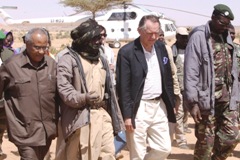Darfur rebels to respect ceasefire, attend talks
Feb 15, 2007 (KHARTOUM) — One of the biggest Darfur rebel factions said on Thursday it would respect a cease-fire and was ready to resume peace talks with the government to try to halt violence in the region that has killed some 200,000 people.
 Peace talks have faltered in the past, and only one of three main rebel factions signed a 2006 deal. Since then the rebels have fragmented into numerous factions, but the group which has agreed to the cease-fire is one of the largest.
Peace talks have faltered in the past, and only one of three main rebel factions signed a 2006 deal. Since then the rebels have fragmented into numerous factions, but the group which has agreed to the cease-fire is one of the largest.
“We will respect the … cease-fire and … once we have our commanders conference we will attend peace negotiations,” rebel commander Jar el-Neby told Reuters.
U.N. Darfur envoy Jan Eliasson and his African Union counterpart Salim Ahmed Salim earlier met Darfur rebel commanders who rejected the 2006 deal.
The U.N. Security Council is expected to consult next week on proposals for a mission to protect civilians in eastern Chad, where attacks launched from Darfur have exacerbated ethnic conflicts and displaced tens of thousands.
At a French-African summit in the southern French resort Cannes on Thursday, Sudan, Chad and Central African Republic agreed not to support rebels attacking each other’s territory, Sudanese Foreign Minister Lam Akol said.
“There is a commitment in this agreement that each country will respect the sovereignty of the other countries and no country will support any rebellion within its territory,”” Akol told reporters after the meeting.
POSITIONS SOFTENED
The Darfur rebels have in the past said they want the 2006 agreement to be scrapped but the government has refused to allow any changes or additions to the accord.
Eliasson told a news conference that those extreme positions seemed to have softened during their talks, and “that leaves diplomatic space.”
Rebels have in the past rejected AU mediation in any new talks on the ground that the first peace deal, which the pan-African body mediated, was biased.
“We will now be happy with mediation from the United Nations and the AU,” said Neby.
The joint team has not yet met the other large rebel faction, the National Redemption Front, whose political leadership is divided. Eliasson said the NRF had wanted to meet in Chad, but logistics prevented his team from traveling there.
Divisions among Darfur’s rebel factions have been a factor in delaying peace talks with Khartoum, and an oft-delayed conference to try to unite their positions is now due to start on Feb. 19.
U.N. Secretary-General Ban Ki-moon said on Thursday that he was awaiting a report from Eliasson and a reply from Sudan’s President Omar Hassan al-Bashir on a joint peacekeeping force of U.N. and African Union troops in Darfur.
“So again, this continuing deteriorating situation in Darfur is just unacceptable,” Ban said.
Sudan has agreed to a joint mission but has objected to more troops coming to Darfur than the 7,000-strong African Union force now on the ground.
The United States is putting pressure on African governments to offer troops for the joint force. State Department spokesman Sean McCormack said in Washington, “We would say that it is your responsibility because of the nature of the situation to make those contributions.”
Ban also said he was disappointed Sudan had broken its promise to allow a U.N. human rights mission into Darfur. He urged Sudan to cooperate fully, adding that if Bashir “believes that there is no problem, then he should be able to receive the human rights fact-finding mission.”
Experts estimate 2.5 million people have been driven from their homes in four years of conflict in Darfur. Washington calls the violence genocide, a term European governments are reluctant to use and Khartoum rejects.
(Reuters)
